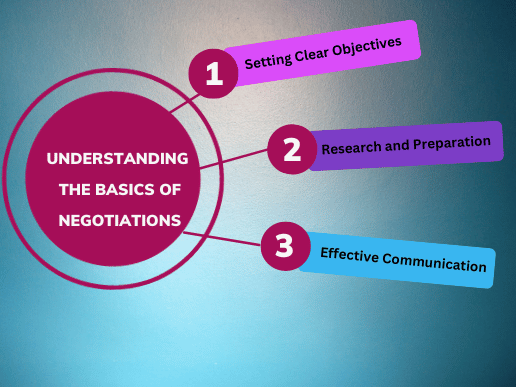Negotiation skills are an essential factor in the world of business.
Whether you're brokering deals or managing conflicts, or simply trying to secure a better price, the ability to negotiate effectively can make or break your success as a professional.
In this article, we will explore the art of negotiation.
And provide you with valuable insights into developing the skills necessary.
For you to achieve positive outcomes in your business interactions.
In the competitive landscape of the business world, negotiations are a cornerstone skill that can drive growth and success.
It plays a pivotal role in decision-making processes.
Also, ensure you get the best deals, form lasting partnerships, and support healthy business relationships.
Understanding the Basics of Negotiation
Setting Clear Objectives
Before entering into any negotiation, it's crucial to define your objectives. What do you want to achieve? Having a clear understanding of your goals will guide your negotiation strategy.
Research and Preparation
Thorough research and preparation are key to a successful negotiation. Knowing the other party's needs, expectations, and potential constraints gives you a significant advantage.
Effective Communication
Communication is the heart of negotiation. Developing active listening skills, articulating your points clearly, and understanding non-verbal cues can greatly change the outcome.
Building Rapport and Trust
Establishing Trust
Trust is the foundation of all successful negotiations. Building rapport with the other party, being honest, and showing integrity are essential for fostering trust.
Finding Common Ground
Finding shared interests and goals can create a positive atmosphere and common ground for negotiation.
The Art of Compromise
Willingness to Compromise
Negotiation often involves giving and taking. Being flexible and open to compromise can lead to mutually beneficial outcomes.
Creating Win-Win Scenarios
Striving for win-win solutions ensures that both parties leave the negotiation table satisfied, fostering long-term relationships.
Overcoming Challenges in Negotiation
Dealing with Conflict
In negotiation, conflicts may arise. Understanding conflict resolution techniques is essential to navigating these challenges effectively.
Handling Difficult Personalities
Some individuals may present unique challenges in negotiations. Learning how to manage difficult personalities can lead to positive outcomes.
Leveraging Technology for Negotiating Skills
Utilizing Negotiation Tools
In the digital age, various negotiation tools and software can streamline the process, enhance communication, and help achieve better outcomes.
Measuring and Evaluating Success
Post-Negotiation Analysis
After a negotiation, it's important to assess the results. Analyzing what worked and what didn’t helps you refine your negotiation skills for future success.
Conclusion of Negotiation Skills for Business Professionals
In conclusion, negotiation skills are a vital asset for business professionals aiming to achieve positive outcomes.
Mastering the art of negotiation, from setting clear goals to fostering trust and embracing compromise, can elevate your success in the business world.
By continually refining your negotiation skills, you'll be better equipped to navigate the complexities of the corporate landscape and secure favorable deals.
Frequently Asked Questions
1. What are the key elements of a successful negotiation?
Successful negotiation involves clear goals, thorough research, effective communication, trust-building, and a willingness to compromise.
2. How can I improve my active listening skills during negotiations?
You can improve your active listening by focusing on the speaker, asking clarifying questions, and summarizing their key points.
3. What should I do if a negotiation becomes confrontational?
When a negotiation turns confrontational, it's crucial to remain calm, focus on the issues, and use conflict resolution techniques to find common ground.
4. How can I use technology to enhance my negotiation skills?
Technology offers negotiation tools and software that can streamline the process, improve communication, and help with data analysis, contributing to better outcomes.
5. Why is it important to evaluate the results of a negotiation?
Evaluating the results of a negotiation allows you to learn from your experiences, find areas for improvement, and refine your negotiation strategy for future success.













